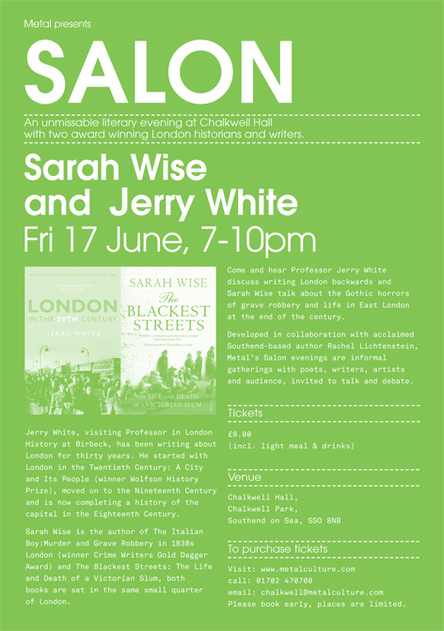|
Last Friday's Salon event, located at the lovely Chalkwell Hall in Southend-on-Sea, was perfect for someone like me who has always been fascinated with London and its history. I also have a strange, unexplained, perhaps unhealthy interest in Victorian society and its multiple facets, be it society, art, literature, mindset. Therefore, this event was a real treat.
The two guests were eminent (see poster above), and it was impressive to be seating (on the floor in my case) no more than a meter away from such people. I guess there is a little bit of envy on my part here: whenever I read about people who are professional writers, who earn a living from their words, I always think "how lucky they are!". Being an author has always been my aspiration and ambition, for as long as I remember. For me, this is the best thing that can happen to someone: to become a published author, whatever they write. I have often said that I am obsessed with writers and their work, and even though Jerry White and Sarah Wise are not fiction writers, they are authors all the same. They do, each in their different way, give out the impression that their mind is full of their work, that they do relish every single minute of the research and the writing. Jerry White’s presence is quiet and understated, but you can catch the twinkle in his eye and some trace of geniality. He is more of a scholar, but one who doesn’t use pompous jargon and whose interests are summarised on his Birkbeck college page as “London and the Londoner from 1700 to the present”. He gave us a preview of his as yet unpublished book on London in the 18th Century – 8 years in the making. He read to us a few vignettes of the time: from a violent, graphic London gallows scene to the life story of a colourful and enterprising lady called Teresa who was involved in the “entertainment industry” of the time – unfortunately, I cannot remember her surname! – via the importance of the theatre and the ravages of gin… 18th Century London came to life in front of our very eyes for a few moments! Sarah Wise’s passion for her subject is highly infectious. A vivacious, voluble woman who seems quite comfortable facing a crowd of anonymous faces, she perfectly communicated to us her enthusiasm for her subject: life in one of the most notorious slums of the Victorian times, the Nichol. She didn’t read any extract of her work but preferred to explain to us how she had come to be interested in the area, what the Nichol was and the myths that have been circulating about the slum. For a while, the past life of “The Blackest streets” of London came back to us and we could almost smell the foul air, hear the grim noises of the hard lives that had been lived in the streets of the Nichol. It was surprising to hear that among the squalor, ideas began to circulate, and the foundations of organisations such as the National Secular Society were laid around those dark streets. I keep finding odd similarities between the Victorian times and our own. Even though a lot of people think that we have changed a lot, I often find that despite our technological and scientific advances, us human beings haven’t changed that much. I smiled when Ms Wise mentioned the fact that in Victorian times, well-to-do people would go to a good dinner in the West End and afterwards, as entertainment, they would go and do a spot of “poor tourism” around slums like the Nichol. I smiled indeed, because after all, people do just that nowadays. The only difference is, they don’t do it in this country but fly to places like India or South Africa, maybe then their conscience is more at ease as it is so far away from home… But I digress. This was no stiff, academic history but REAL history, the one we want to hear about. The one you wish they would have taught you at school. There is an in-depth review of Sarah Wise’s “The Blackest Streets: The Life and Death of a Victorian slum” here: THE BLACKEST STREETS Rachel Lischtenstein, the host of the evening, has just posted a link to an interesting article written by Sarah Wise about Arthur Morrison's novel "A Child of the Jago", The Jago being the fictionalised version of the Nichol:AMore on Jerry White’s work: JERRY WHITE AT BIRKBECK Comments are closed.
|
AuthorI think therefore I write. Archives
June 2024
CategoriesAll Art Books Cinema Culture Events Idea Ideas Inspiration Inspirations Literature Music People Places Promo Publishing Reading Reviews Self Publishing Self Publishing Self-publishing Society Theatre Thoughts Working Work In Progress Work In Progress Writing Writings |

 RSS Feed
RSS Feed
